LONDON — King Charles III’s already undisputed claim to the British throne got the royal rubber stamp Saturday when what’s known as the Accession Council formally proclaimed the eldest son of Queen Elizabeth II the new monarch.
There was pomp and pageantry and tradition — and zero suspense — because Charles became king when Elizabeth died Thursday at Balmoral Castle in Scotland.
Charles’ accession to the throne was a modern version of the Anglo-Saxon Witan, a two-part gathering of notables that predates the Middle Ages and that was called after a sovereign died.
But this was the first time this ancient ceremony was televised and millions around the world watched as the 73-year-old swore to uphold the constitution, protect the Church of Scotland, and signed the proclamation that made him king.
Follow NBC News’ live coverage here.
Crowd gathered outside St. James’s Palace in London bore witness to the fanfare and the deafening fusillades that followed the proclamation.
"My mother’s reign was unequalled in its duration, its dedication and its devotion," said Charles, who was clad in a black suit of mourning. "Even as we grieve, we give thanks for this most faithful life. I am deeply aware of this great inheritance and of the duties and heavy responsibilities of sovereignty, which have now passed to me."
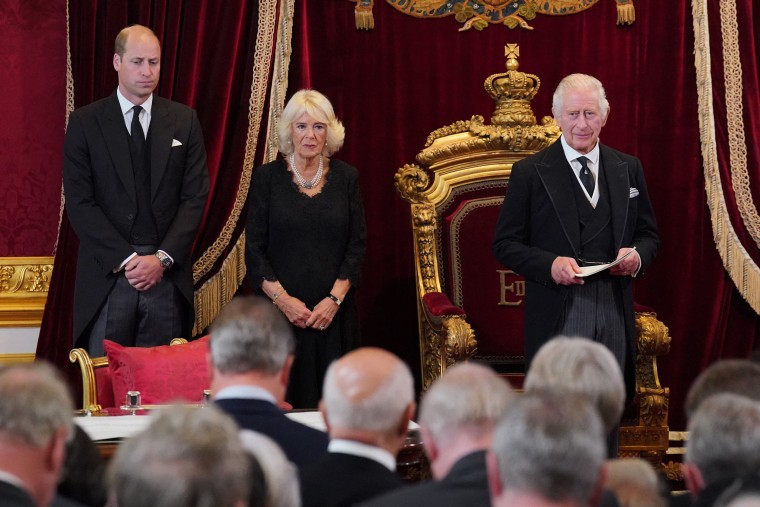
His wife, Camilla, the Queen Consort, and his eldest son, William, who now carries his father's former title, the Prince of Wales, stood alongside Charles as he spoke.
When he finished and the proclamations were signed, Penny Mordaunt, the Lord President of the Council of the United Kingdom and a senior Conservative Party politician, asked the new king whether the declaration that has just been signed could be made public.
“Approved,” Charles replied.
No date has been set for Charles' coronation, where he will receive the orb and scepter as symbols of his reign.
Charles was cheered on by large crowds seeking to get a glimpse of the new king as his motorcade headed back to Buckingham Palace from nearby St. James's Palace. The sound of drumbeats echoed across the city as the proclamation was reread and soldiers dressed in brightly colored uniforms from an earlier era marched through the streets.
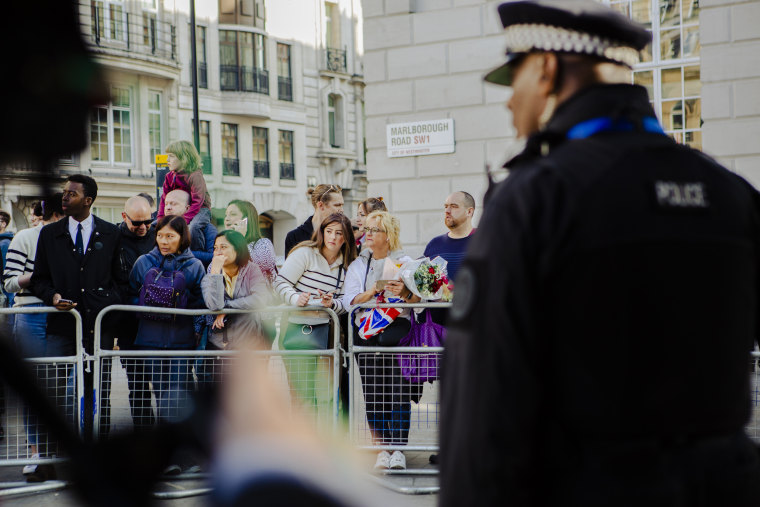
Charles wasn't at St. James's Palace earlier Saturday when the 680 or so privy counselors, who are mostly current and past politicians, judges and clergy from the United Kingdom and the Commonwealth, gathered in the Picture Gallery to formalize his ascension to the throne.
Joining them was the new British prime minister, Liz Truss, and many of her predecessors, London Mayor Sadiq Khan and the high commissioners from the Commonwealth countries where Charles will also be king.
Charles arrived for the second part of the ceremony with Camilla, William and his wife, Catherine, the Princess of Wales. There, Charles made his personal declaration and took his oath before the Archbishop of Canterbury.
The new king could have chosen to reign under a different name. But once again, the carefully choreographed royal transition following the death of Elizabeth eliminated any chance Charles might take another royal name like George, which was the name of his maternal grandfather, George VI.
When Charles left the room, four trumpeters clad in gold-colored uniforms heralded the arrival of David Vines White, the Garter King of Arms, which is a heraldic position that has been in the royal household since 1484.
White then read a proclamation announcing that Charles is the new king of England from the balcony of St. James’s Palace overlooking the Friary Court.
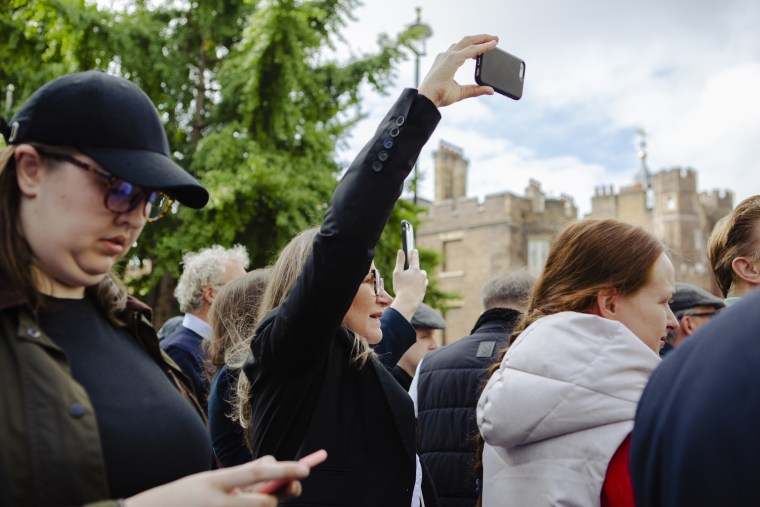
"Whereas it has pleased Almighty God to call to his mercy our late sovereign lady Queen Elizabeth the Second of blessed and glorious memory, by whose decease the crown of Great Britain and Northern Ireland is solely and rightfully come to Prince Charles Philip Arthur George," the proclamation began.
"God save the king!" he declared.
In London and across the country, flags that had been lowered at public buildings after Elizabeth died were raised to full-staff.
Back at St. James's Palace, a military band played the first verse of the national anthem, which for the 70 years of Elizabeth's reign, was known as "God Save the Queen."
Shortly afterward, a 41-gun salute erupted at London’s Hyde Park which was followed by a 62-gun salute at the Tower of London.
"Three cheers for his majesty the king," White declared, while below the members of the Kings Guard removed their iconic bearskin hats. "Hip, hip!"
"Hooray," they replied three times.
Outside the palace, three women who did not know each other before Saturday — Astrid Jacobs, Virginia Forbes and Penny McDermid — became fast friends as they waited for Charles to arrive.
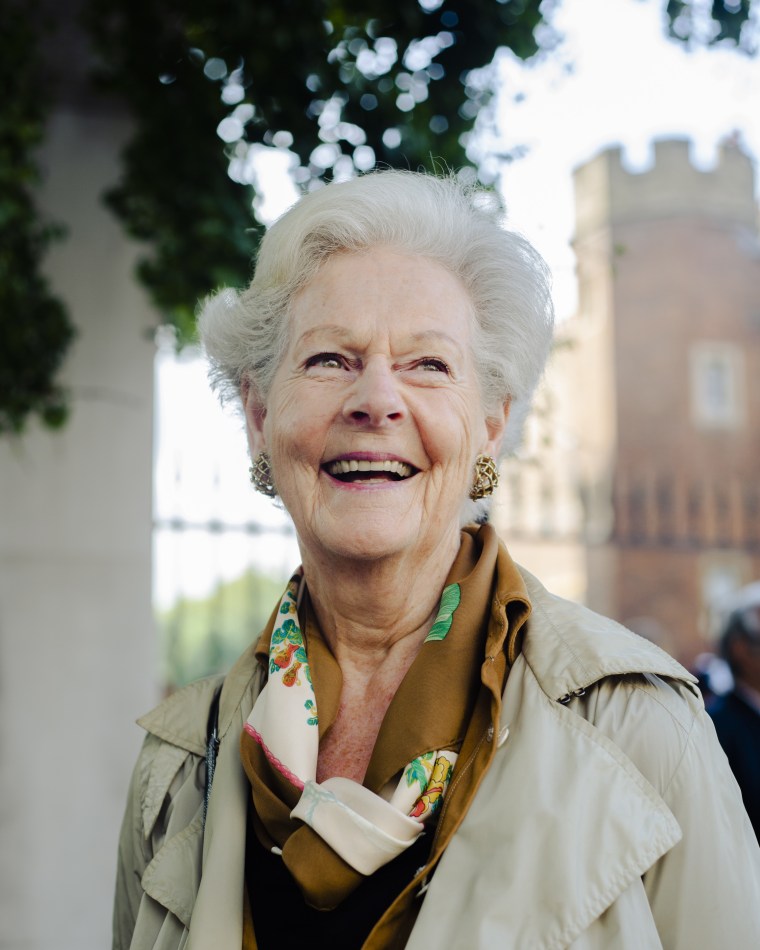
McDermid, who lives in London, said she feels an overwhelming sense of hope for the country’s future but acknowledged that Elizabeth will be a “tough act to follow.”
“She almost never put a foot wrong, was not a political figure, was basically universally loved,” she said. “It’s going to be very hard to live up to that.”
Jacobs, who lives in Cambridge, said she's happy for Charles but still mourning the queen.
“It’s a mixed time I find, emotionally,” she said. “You’re trying to reconcile the future with the pain that you’re feeling at her loss. I wasn’t prepared.”
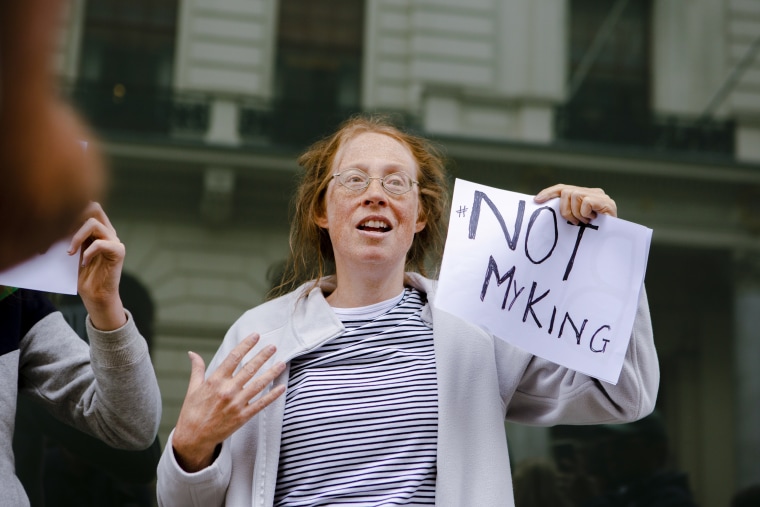
Not everybody was cheering for Charles. Outside St. James's Palace, a mother and her 13-year-old daughter who had been carrying placards that read "Not my king" and "Republic now" had the signs torn out of their hands by angry supporters of the royals.
“I’m really stunned,” said the mother, who asked not to be identified by name but who said she was born in the United States and had lived in London for more than 20 years. “Violence has no place in political discourse. The monarchy has become a harmful tradition.”

